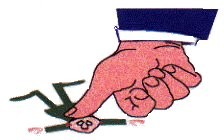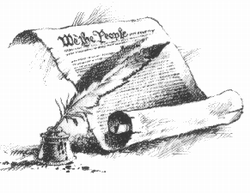How About the TSA's Heavy, Arbitrary Hand?
 A couple weeks ago, ANN warned the world of another TSA
move against aviators and their livelihoods, in the name of a
misdirected 'national security' policy.
A couple weeks ago, ANN warned the world of another TSA
move against aviators and their livelihoods, in the name of a
misdirected 'national security' policy.
Briefly, the TSA can now simply blacklist any
FAA certificate-holder, and the FAA must pull that airman's ticket,
immediately, with no evidence of any kind required. The FAA has
requested comments, and a few dozen, including ANN Publisher, Jim
Campbell and ANN Correspondent Juan Jim�nez, have commented;
here's mine --Tim Kern, News Editor, Aero-News Network
Re: FAA-2003-14293
This proposal is illegal, unnecessary, and unworkable.
 1) It's illegal,
because it deprives an individual of his Fifth Amendment
protections, doing away with due process. (A certificate issued by
the FAA permits exercise of 'liberty;' and it may also be a key to
permit one to make a living -- a necessary condition to acquiring
and holding 'property;' both liberty and property are protected by
Amendment V.)
1) It's illegal,
because it deprives an individual of his Fifth Amendment
protections, doing away with due process. (A certificate issued by
the FAA permits exercise of 'liberty;' and it may also be a key to
permit one to make a living -- a necessary condition to acquiring
and holding 'property;' both liberty and property are protected by
Amendment V.)
Additionally, since there is no known way to get on such a
blacklist, there is also no known way to get off: since the TSA is
the sole arbiter of the criteria used to blacklist a certificate
holder, and since it need not in any way justify its placing a
certificate-holder on such a list, the likelihood of a suspect's
clearing himself through appeal to the agency that already declared
him a 'threat,' is nil.
The suspended suspect cannot know the charges or witnesses against
him, which is a clear violation of the Sixth Amendment (even though
the TSA has opted to hold its own 'court,' another illegal aspect
of this Rule).
 In addition to the fact that
the conditions determining a 'threat' are not known, the level of
'threat' that the TSA's suspect is alleged to pose has never been
defined. With no threshold, anyone deemed to pose any kind of
'threat' could be deprived of his ability to make a living, with no
notice, and no proper investigation.
In addition to the fact that
the conditions determining a 'threat' are not known, the level of
'threat' that the TSA's suspect is alleged to pose has never been
defined. With no threshold, anyone deemed to pose any kind of
'threat' could be deprived of his ability to make a living, with no
notice, and no proper investigation.
It's also outside the TSA's authority, to dictate to the FAA which
of the FAA's duly-issued certificates (and permits) must be
suspended, with the FAA's not being privy to the TSA's reasoning.
The FAA is the sole issuer of such paper; it also has the sole
authority to pull it. (If the TSA has compelling evidence, let it
convince the FAA.)
2) It's unnecessary, because the mere
possession of a pilots' (or other) certificate is not a sufficient
condition to flying, repairing, directing, etc., an aircraft; and
the lack of one would not, under nearly all circumstances, do
anything at all prevent a previous holder from practicing the
craft. (If a person were intent on, say, committing suicide and/or
taking innocent lives, would the threat of action subsequent to
certificate suspension be a deterrent?)
 Additionally, if the TSA can
actually identify a 'security threat,' the mere notification to
that person that he now holds a suspended certificate is unlikely
to change any nefarious intent. If the TSA can identify such a
threat, one would hope that suspension of his ticket would not be
the government's only action.
Additionally, if the TSA can
actually identify a 'security threat,' the mere notification to
that person that he now holds a suspended certificate is unlikely
to change any nefarious intent. If the TSA can identify such a
threat, one would hope that suspension of his ticket would not be
the government's only action.
The TSA has said that it would use this power perhaps once a year;
if that were true, it would not need this Rule. That has already
been demonstrated, in August of 2002, when the FAA cooperated in
the suspensions of five certificates.
3) It's unworkable on several levels. First, as
noted above, the suspension of such a ticket will not deter a
criminal.
Secondly, if the suspect is indeed a threat, the mailing of such
notice will most likely be ineffective.
If you'd like to add your own 2�, hit the link below, and
reference Document # FAA-2003-14293.
 Classic Aero-TV: Pure Aerial Precision - The Snowbirds at AirVenture 2016
Classic Aero-TV: Pure Aerial Precision - The Snowbirds at AirVenture 2016 NTSB Final Report: Costruzioni Aeronautiche Tecna P2012 Traveller
NTSB Final Report: Costruzioni Aeronautiche Tecna P2012 Traveller ANN's Daily Aero-Linx (11.23.25)
ANN's Daily Aero-Linx (11.23.25) ANN's Daily Aero-Term (11.23.25): Request Full Route Clearance
ANN's Daily Aero-Term (11.23.25): Request Full Route Clearance Aero-News: Quote of the Day (11.23.25)
Aero-News: Quote of the Day (11.23.25)






